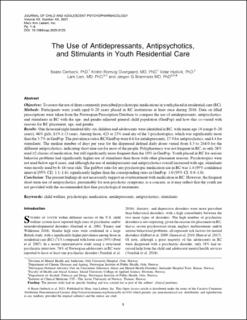The Use of Antidepressants, Antipsychotics, and Stimulants in Youth Residential Care
Peer reviewed, Journal article
Published version
Permanent lenke
https://hdl.handle.net/11250/3010499Utgivelsesdato
2021Metadata
Vis full innførselSamlinger
- Artikler [5068]
- Publikasjoner fra CRIStin FHI [7544]
Originalversjon
Journal of child and adolescent psychopharmacology. 2021, 1-8. 10.1089/cap.2020.0123Sammendrag
Objectives: To assess the use of three commonly prescribed psychotropic medications in youth placed in residential care (RC). Methods: Participants were youth aged 0-20 years placed in RC institutions at least once during 2016. Data on filled prescriptions were taken from the Norwegian Prescription Database to compare the use of antidepressants, antipsychotics, and stimulants in RC with the age and gender adjusted general child population (GenPop) and how this co-varied with reasons for RC placement, age and gender. Results: 1856 children and adolescents were identified in RC, with mean age 14 (range 0-20 years), 46% girls, 81% ≥13 years. Among those, 423 or 23% used any of the three psychotropics, significantly more than the 3.7% in GenPop. The prevalence ratios RC/GenPop were 6.6 for antidepressants, 17.9 for antipsychotics, and 4.4 for stimulants. The median number of days per year for the dispensed defined daily doses varied from 8.3 to 244.0 for the different antipsychotics, indicating short time use for most. Polypharmacy was not frequent in RC, as only 26% used ≥ 2 classes of medication, but still significantly more frequent than the 10% in GenPop. Youth placed in RC for serious behavior problems had significantly higher use of stimulants than those with other placement reasons. Psychotropics were not used below age 6 years, and while the use of antidepressants and antipsychotics overall increased with age, stimulants were mostly used by 6 to16 year olds. The girl/boy ratio for any psychotropic medication use in RC was 1.4 (CI: 1.1-1.6), significantly higher than the corresponding ratio in GenPop: 1.0 (CI: 0.9-1.0). Conclusion: The present findings do not necessarily suggest an overtreatment with medication in RC. However, the frequent short-term use of antipsychotics, presumably for non-psychotic symptoms, is a concern, as it may reflect that the youth are not provided with the recommended first-line psychological treatments.
